So you just tried our 5 Flexibility Tests, and you determined that you’re about as flexible as a steel rod.
Don’t worry; all hope is not lost.
Here is a list of the 9 best stretches to improve your flexibility fast.
You can do hundreds of stretches, but some are more useful than others.
This post will cut through all that junk and show you the top 9 stretches you need to regain the mobility your mama gave you.
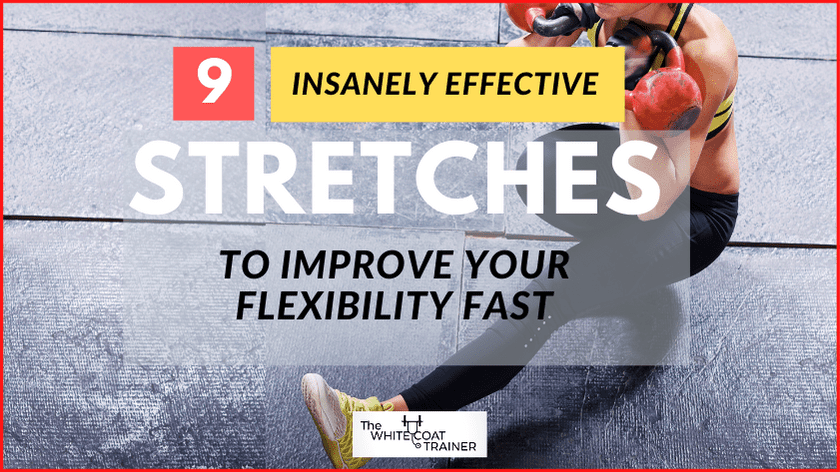
The 9 Best Stretches To Improve Flexibility Fast!
Alright, let’s get right to it.
Here are the top 9 stretches to improve your flexibility listed by body part.
The entire routine will address the most significant problem areas often seen in the general population.
Each stretch will also include the functional movement pattern associated with them.
I call this, functional stretching.
Shoulder Stretches
We will begin with the shoulders and work out way down.
Double Internal Rotation Stretch
Shoulder internal rotation is critical when performing pushing exercises such as dips, push-ups, and bench presses.
Unfortunately, a lot of people lack shoulder internal rotation. Chances are you do too.
A lack of mobility in this movement pattern increases the risk of injury in your shoulders during pushing exercises.
Here is a quick and easy stretch that allows you to improve the internal rotation of both shoulders simultaneously.
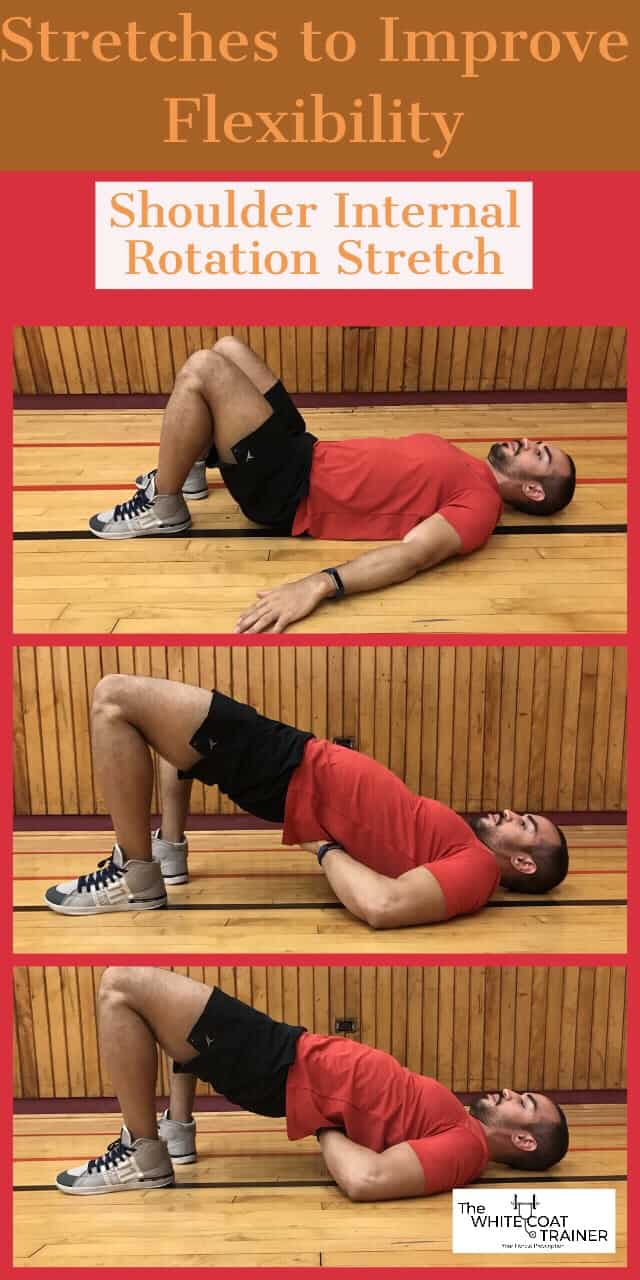
Lie on your back and elevate your hips off the ground. Squeeze your scapula together. Place your hands underneath your back as high up as possible, with your palms facing downwards. Slowly lower your hips down toward the floor until you feel a stretch in your shoulders. DO NOT let your shoulders roll forward or come out of their retracted position.
Shoulder Extension Stretch
Many people also lack shoulder extension or the ability to bring their shoulders behind their bodies.
Shoulder extension limitations are because we are anterior dominant, and we often do not deal with things behind us.
Shoulder extension is necessary for optimal shoulder health and mobility.
Please don’t ignore it.
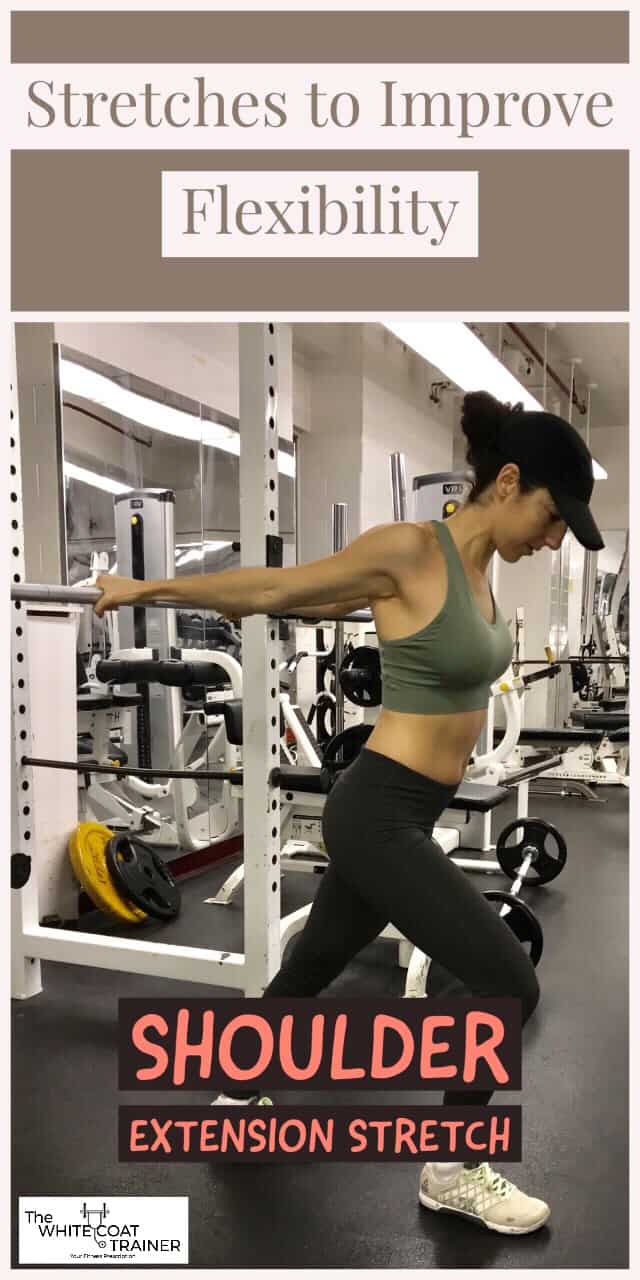
Find a ledge, table, or barbell that you can anchor your hands on. Position both arms behind you with your palms down and keep your shoulders locked into their sockets and your shoulder blades retracted. You can lower yourself to increase the stretch. If this stretch is too painful, try one arm at a time.
Back Stretches
If someone were to tell you to stretch your back, you’d probably bend down to touch your toes or begin rotating your spine like crazy.
Most people do not need to stretch their lower backs.
The vertebrae of your lumbar spine are meant to be for stability, not mobility.
Instead, you probably need to stretch your upper back and improve thoracic mobility.
Thoracic mobility will allow you to maintain a healthy posture and keep your shoulders where they need to be.
These are the best stretches for your upper back/thoracic spine.
Thoracic Extension Stretch
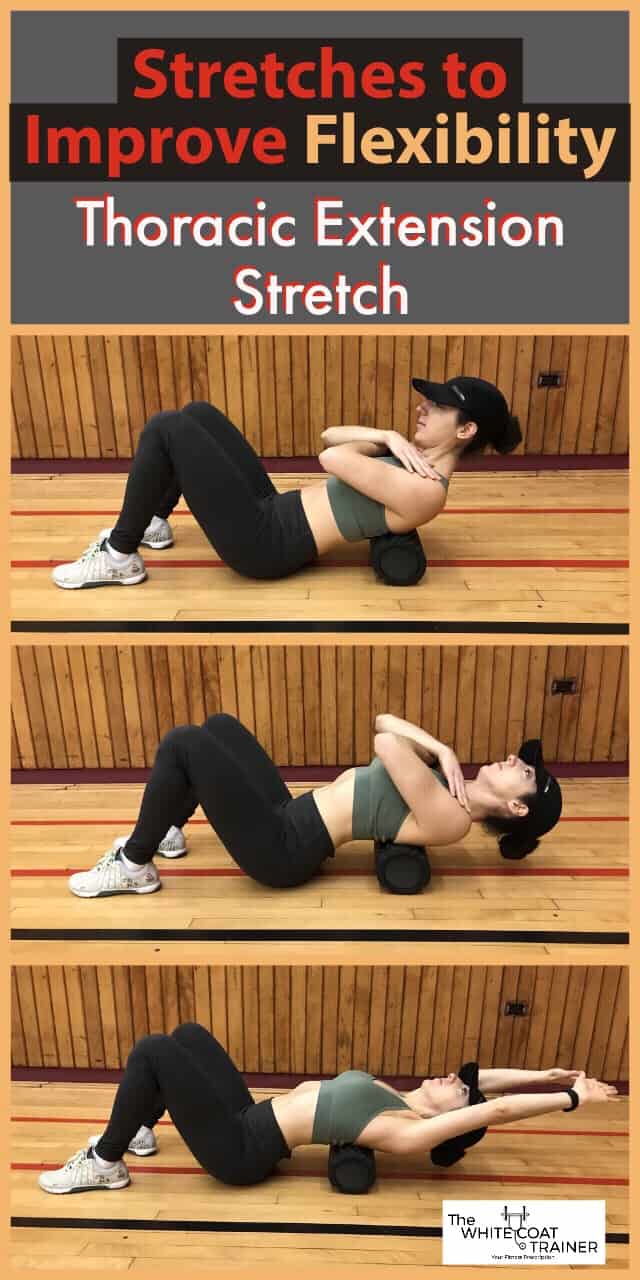
Position yourself on top of a foam roller lying horizontally across your thoracic spine. Raise your arms overhead and begin arching your upper back over the foam roller. Keep your core tight and engaged throughout the stretch. Try not to let your lower back arch.
Double Overhand Lat Stretch
The lattisimus dorsi muscle is another problem area in the general population. Tight lats can often pull your shoulders into unhealthy positions, limit your overhead mobility, and increase shoulder injury.
Here is one of the best stretches for the lat muscles.
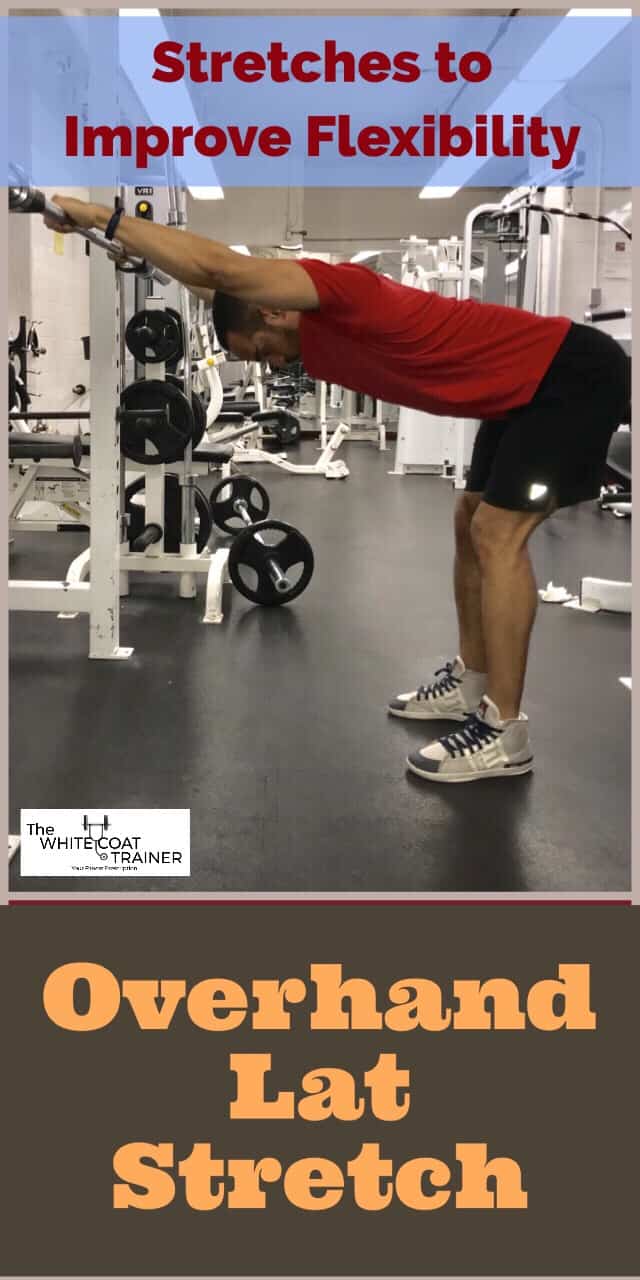
The double overhand lat stretch will improve your spinal position during squats and your overhead reach position, and it will also help treat a rounded upper back posture. Check out You Probably Have Bad Posture- Here’s How to Tell to learn more.
Place your hands palms down on a desk or a barbell set in a rack. Keep your scapula retracted and your shoulder back. Brace your core and begin hinging at the hips to bring your chest toward the ground. Make sure to keep your arms straight. Maintain your knees locked out and your back neutral. You can increase the stretch by driving your chest down.
Chest Stretch
Doorway Pec Stretch
The chest is by far one of the most commonly restricted areas in the general population. Again, likely due to the fact that we are anterior dominant creatures.
A tight chest will round your shoulders and worsen your posture. Here is a great way to open up the pecs and reverse the restriction.
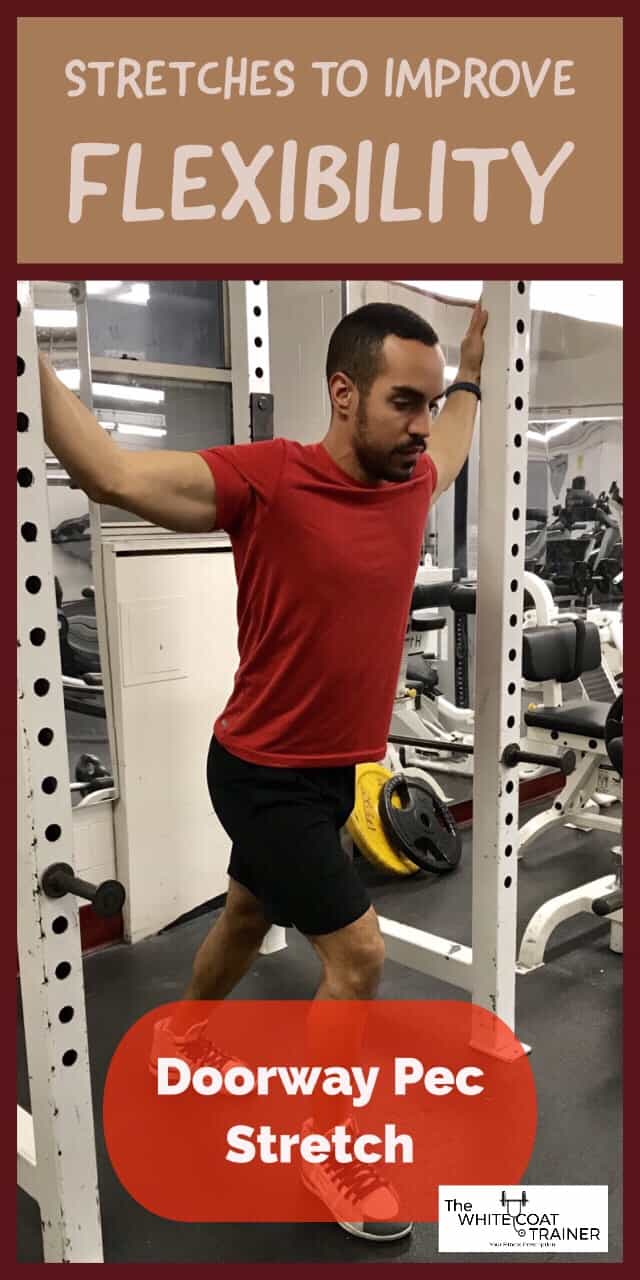
Position yourself in a doorway or power rack so that you can place your arms perpendicular to your body. Keep your scapula and shoulders back. Brace your core and try to push your chest forward while keeping your arms locked in place.
Okay, now let’s go over the best stretching exercises for the legs. We will begin with the hips and work our way down.
Hip Stretches
Wall Squat Stretch
Are you able to get into a deep squat with your heels flat on the floor and your back flat?
Don’t worry. Many people struggle with this fundamental movement, and here is one of the best stretches to alleviate that problem.
The wall squat stretch is pretty self-explanatory, and you will feel it pretty much everywhere in your hips. This stretch improves hip range of motion for squats, thoracic position for squats, and ankle mobility.
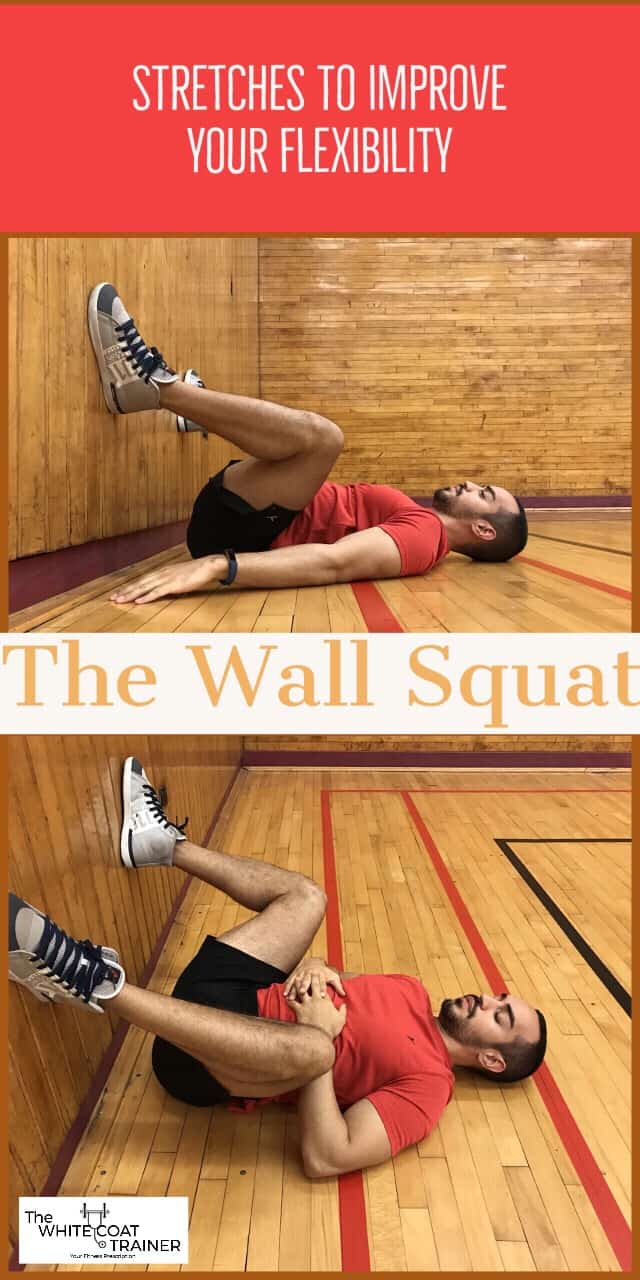
Lie down on your back and position your butt as close as you can to a wall. Place your feet flat on the wall in a squat stance. Keep your feet pointing forward and your back and head flat on the floor. Use your elbows to push your knees outwards. For an added bonus, you can stretch your arms overhead to also work on overhead mobility.
The Couch Stretch
Are you ready to hurt?
Oh man, do I hate this stretch. Whenever you dislike a stretch, it is probably because you really need to work on it.
The couch stretch is one of the most brutal yet effective stretches in improving hip range of motion.
It also stretches the hip flexors and the quads simultaneously, making it twice as good.
Almost everyone needs to use this stretch due to our obsession with prolonged sitting. This stretch improves squats and lunges flexibility, and it is also one of the best hip stretches for lower back pain.
Try this hip flexor stretch. I dare you.
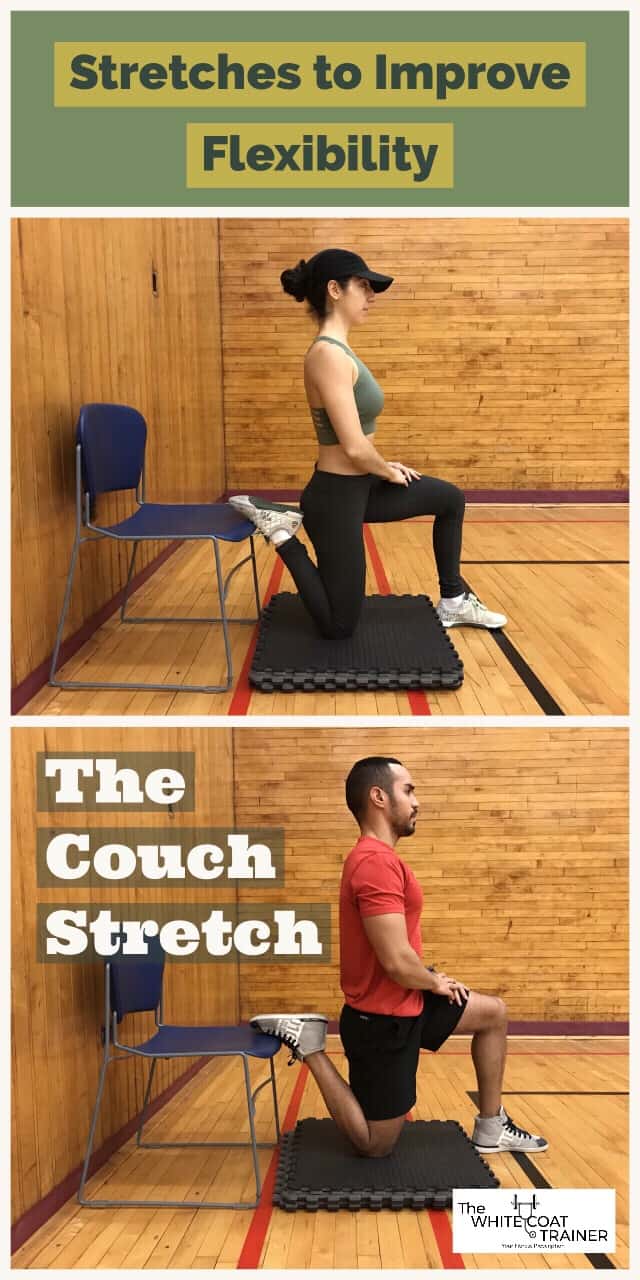
Find a bench or a chair to elevate your rear foot with a vertical shin. Keep your front leg at a 90 degree angle with your knee directly above your foot. Squeeze the glute of the back leg and keep your torso as neutral as possible. You should feel a nice stretch in the front of your thighs. As you become more flexible, attempt to make contact between your glute and your back heel.
Hamstring Stretch
Now let’s go over a safe and effective way to stretch your hamstrings.
However, if you have anterior pelvic tilt, you might actually need to strengthen your hamstrings rather than stretch them.
Banded Hamstring Stretch
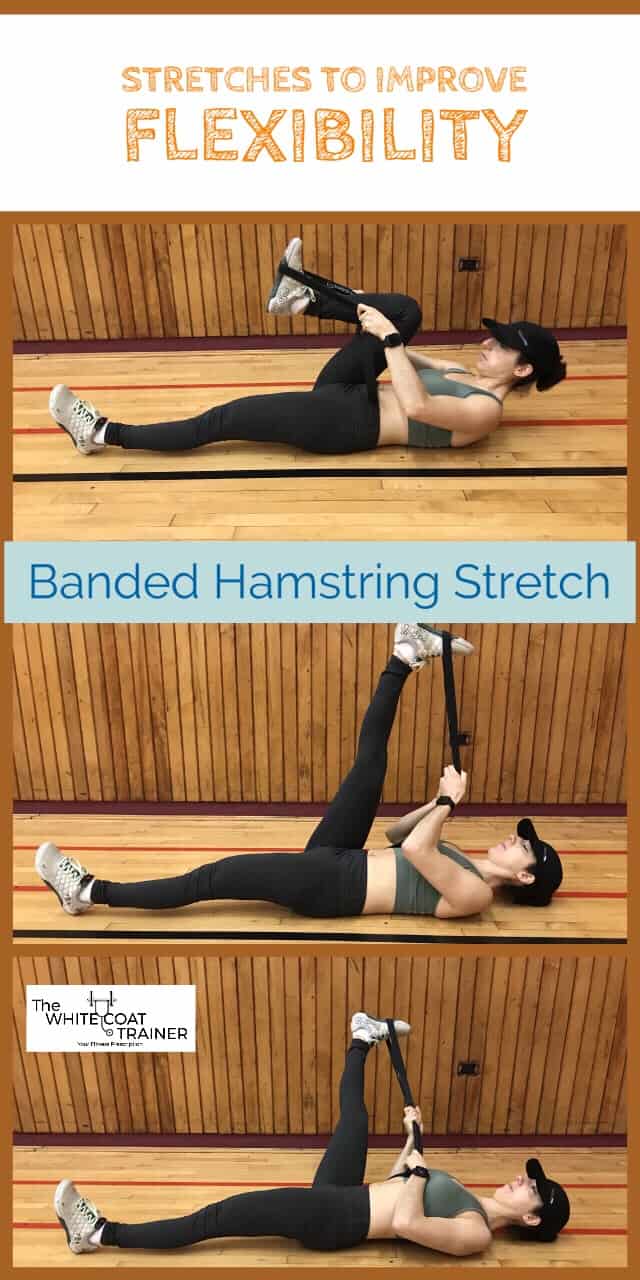
Lie flat on your back and obtain a band or a rope. Place the band on your foot and straighten your knee. Keep your other leg straight on the floor and keep your back neutral on the floor. Feel free to bring your hamstring to varying angles from your body.
Ankle / Calf Stretch
Almost everyone has tight calves and restricted ankles. Especially runners. Keeping your ankles flexible and your calves supple is very important because failure to do so will cause significant problems upstream.
This includes knee pain, and ultimately hip pain.
Fortunately, using this simple stretch often will help improve calf flexibility.
Downward Dog
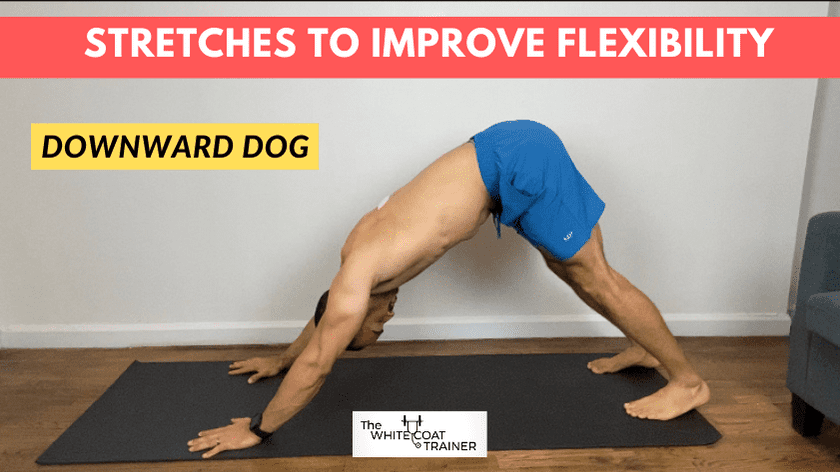
Get into a push-up position and walk your hands towards your feet until your butt is picked up toward the ceiling. From here, straighten your knees as much as you can to flex your ankle and stretch your calves.
That’s it. These are the 9 most effective stretches you need to get flexible fast.
If you thought these stretches were superb, head over to Kelly Starrett’s website, Mobility WOD, to learn more stretches for the entire body.
Frequently Asked Questions
How long does it take for flexibility to improve?
It usually takes around two to four weeks to see improvements in your flexibility as long as you stretch ~five days per week. You also need to make sure that the stretches push you to slightly uncomfortable ranges.
Can a stiff person become flexible?
Most people can become flexible as long as they are willing to stick with a regular stretching routine for the long term. Stretch at least 5 times per week for maximum effect.
What Stretches Should You Include In Your Flexibility Training Program?
You should stretch only if you lack flexibility in key functional movements.
This is where flexibility exercises come into play.
Flexibility exercises are done for a specific purpose. If you cannot achieve a full range of motion in a key functional movement pattern, then you stretch to improve that position.
If you need to know the 5 positions you should be able to perform, go back to Part 2 of this series.
How to Create a Flexibility Workout Plan For Beginners
After you determine which areas you need to stretch, then you can create a workout plan to improve your flexibility.
Here’s how:
1) Write down your limitations and group them into categories.
The categories can be broken down by the major muscle groups:
- Shoulders
- Upper Back
- Quads/Hips
- Hamstrings
- Calves/Ankles
If you lack flexibility in all 5 categories, that is ok. Improving flexibility in one major joint can help improve the flexibility in other joints.
2) Divide the areas that need improvement into upper body and lower body.
3) Select 2-3 stretches that you will work on each day for your upper or lower body.
4) Spend 5-10 minutes before bed each day alternating between 2-3 upper body stretches on 1 day and 2-3 lower body stretches the next day.
This will help alleviate the monotony of stretching and also help relax you for bed.
How Long Should I Stretch?
It is essential to hold the position for at least 30 seconds when performing these flexibility exercises.
Research has shown that anything beyond this confers less benefit; however, many anecdotes show people experiencing significant improvement from holding stretches for up to 2 minutes.
Bottom line; hold each stretch from 30 seconds to 2 minutes.
How Often Should I Stretch?
I recommend stretching on a daily basis for a maximum of 5-10 minutes. The more you stretch, the better you will be.
If you can’t stretch every day, it is vital to do this AT LEAST 5 days a week. Persistence is key in improving flexibility. Find a way to integrate the stretches into a pre-sleep ritual.
It is certainly not necessary to stretch more than once per day.
When Should I Stretch?
It is always best to stretch muscles when they are warm. Therefore it’s best to do it after a workout or a warm shower.
As discussed in “when is stretching necessary,” it is not ideal for stretching before a workout as a warm up. Overly stretching cold muscles might increase your risk of injury.
Otherwise, if you are not working out that day, you can do your stretching session right before bed.
Should I do dynamic or static stretching?
When doing these stretches, you can perform them as dynamic stretches or as static stretches.
In dynamic stretching, you can oscillate in and out of the end range rather than just holding the end range.
In static stretching, you reach the end range and hold that position.
Either way, make sure to do deep diaphragmatic breathing whenever you are stretching. Inhale nice and slowly, and exhale nice and slowly.
An Effective Flexibility Training Program
Here is a quick example of a flexibility training program that you can use to work on your entire body. They are broken up into upper body and lower body days.
DAY 1: Upper Body (Great for Improving Overhead Technique)
| Stretch | Sets | Hold Time |
|---|---|---|
| Thoracic Extension Stretch | 1-2 | 1-2 minutes |
| Double Overhand Lat Stretch | 1-2 | 1-2 minutes |
| Chest Opener Stretch | 1-2 | 1-2 minutes |
Day 2: Lower Body (Great for Improving Deadlift Technique)
| Stretch | Sets | Hold Time |
|---|---|---|
| Couch Stretch | 1-2 | 1 min each side |
| Banded Hamstring Stretch | 1-2 | 1 min each side |
| Downward Dog | 1-2 | 1-2 minutes |
Day 3: Upper Body (Great for Improving Pressing Technique)
| Stretch | Sets | Hold Time |
|---|---|---|
| Shoulder Internal Rotation Stretch | 1-2 | 1-2 minutes |
| Shoulder Extension Stretch | 1-2 | 1-2 minutes |
| Chest Opener Stretch | 1-2 | 1-2 minutes |
Day 4: Lower Body (Great for Improving Squat Technique)
| Stretch | Sets | Hold Time |
|---|---|---|
| Wall Squat | 1-2 | 1-2 minutes |
| Couch Stretch | 1-2 | 1 min each side |
| Downward Dog | 1-2 | 1-2 minutes |
Rinse and repeat.
However, if you’d like a complete 10-minute routine to improve your posture and mobility, check out our mobility program for just $7. You’ll also learn how to determine if you have poor posture and how to fix it.
Final Words On The Best Exercises To Increase Flexibility
You don’t need to do hour-long yoga sessions to notice an improvement in your flexibility.
You also don’t need a deck of hundreds of stretches.
Use these 9 stretches to improve flexibility and regain control of your body.
Next, you should learn:
- You Probably Have Bad Posture, Here’s How To Tell
- The Best Posture Correction Exercises To Help Restore Your Body
- What To Do When You Have Muscle Soreness
Now we turn it over to you
Which stretches are your favorites?
Any you would add to this list?
Do you have a lot of restrictions? Or are you naturally very flexible?
Comment below and let us know!
By the way, what is the purpose of having flexibility if you aren’t going to use it in the real world? Why not go develop the functional movement patterns that these stretches improve by checking out The Best Strength Training Template For Busy Professionals.

Alex Robles, MD, CPT / Brittany Robles, MD, MPH, CPT
Alex & Brittany Robles are physicians, NASM Certified Personal Trainers, and founders of The White Coat Trainer: a resource dedicated to improving the health and fitness of busy professionals using time-efficient strategies. Their advice has been featured in My Fitness Pal, Prevention, Livestrong, Reader’s Digest, Bustle, The Active Times, and more. Learn more about them here.

These tips are great and so comprehensive! I can tell that I am losing flexibility as I get older, and it’s wonderful that you included when and how to stretch. Fab ideas!
Thank you Jennifer. These stretches are definitely effective. Good luck and let us know if there is any other way we can help you.
Thanks so much for sharing. The quality of the explanations with the pictures is great! Aaaaaand now I’m gunna go stretch! Haha
Your’e very welcome. Let me know how it goes 🙂
I really need that now, I as hiking and all my body hurts
We will be going hiking really soon, so we will need to follow our own advice!
Awesome tips, thank you!! I use to be sooo flexible as a child/teen when I was participating in gymnastics and dance, but now I am the most non flexible person haha! I will start to include these stretches into my workout routine 🙂
I hear you. Flexibility tends to disappear as we get less active and sit more. Give them a shot and let us know how it goes!
Thank you for the great tips! I am not as flexible as I would like to be and I’m going to start incorporating these stretches in with my workout!
You’re welcome. Let us know how it goes!
Great stretches. Thank you for posting!
You’re welcome. Thanks for reading.